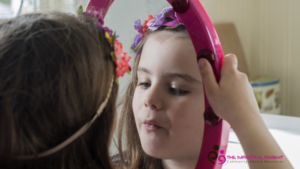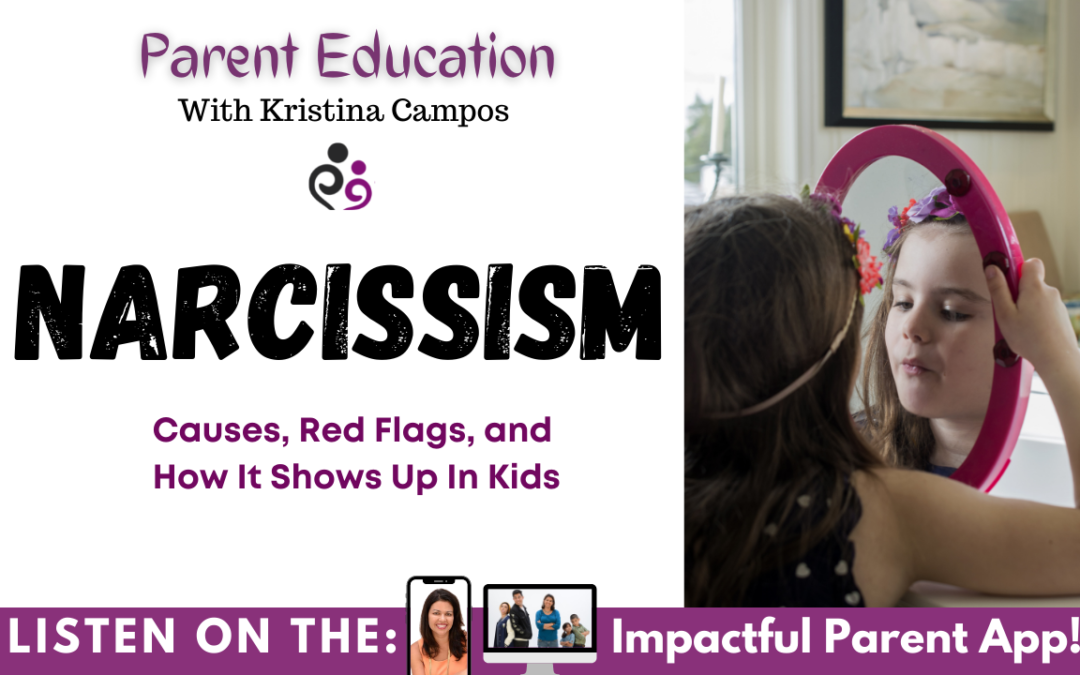Narcissism In Children Can narcissism be hereditary? Can genes pass this trait down to our kids? Impactful Parent founder, Kristina Campos, talks about the signs of narcissism in children, causes of narcissism, red flags and signs of narcissistic tendencies, and tips for parents to prevent a growing narcissistic kids. Watch today!
Watch the Video below
LINKS MENTIONED IN THE RECORDING
https://theimpactfulparent.com/app Download the FREE Impactful Parent App! Available on Apple and Android App Stores. FREEBIES from episodes included!
Apple Store: https://theimpactfulparent.com/ios
Android Play Store: https://theimpactfulparent.com/android
https://theimpactfulparent.com for more FREE Resources and paid programs.
TRANSCRIPT
Narcissism In Children
Welcome Impactful Parents. Today we are going to talk about narcissism.
Hello, my name is Kristina Campos. I am the founder of the Impactful Parent. Every week I come on and answer one of your questions LIVE. If you have a question for next week, please submit it at theimpactfulparent@gmail.com or by messaging me on social media. All submissions are kept anonymous.
Today’s question from the audience is asking about narcissism. Is narcissism hereditary? The audience member thinks their parent is a narcissist and worry that their child might have inherited the personality flaw. So, these parents ask, “Can genes pass on this disorder to kids?”
Thank you for submitting this question! Today I will talk about narcissism, its causes, and red flag warning signs. And stick around to the end because I will explain how parents could be making narcissism worse. Let’s get started!

Narcissism In Children
Narcissism is characterized by a sense of grandiosity, they want admiration by others, the need for attention, superficial interpersonal relationships, and a lack of empathy. Typically, narcissism is not diagnosed in children as personality changes and evolves until adulthood. Throughout development, children go through phases that include self-centered tendencies or inflated views of themselves. This is normal. It is more concerning when these traits persist after puberty. Still, parents need to recognize the CAUSES, SYMPTOMS, and SIGNS of narcissism to help their children prevent a deep onset of this disorder because narcissistic adults struggle with their relationships and don’t deal with the stress well, and find opposing opinions difficult to accept. This brings a lot of conflict into their lives, leading to an increased risk of anxiety, depression, drug abuse, and suicide.
CAUSES: So what causes narcissistic personality disorder? Experts have different opinions, and the bottom line is they aren’t sure. Some experts claim that it can be genetic. Still, most doctors agree that environmental factors play a role in creating a narcissist, including parental influences, which I will address in a few minutes.
What Does Childhood Narcissism Look Like?: Among the myths about narcissistic people is that they believe themselves to be better than others. This is not true. Narcissism is rooted in insecurity, even if the narcissist doesn’t realize it. Outwardly they will overcompensate with confidence. That is why many narcissists appear arrogant, entitled, act as though they are superior to others, and feel like they deserve special treatment. Another outward quality will likely include being the center of attention. Narcissists also have turbulent relationships. Value is only given to people if they are considered useful, so many narcissists belittle and exploit others. They cannot empathize, too. At the same time, narcissists are dependent upon other people to reaffirm their self-image. Narcissists who do not receive attention and praise feel empty, bored, depressed, or restless.

Narcissism In Children
So how can I tell if I have a child turning narcissistic?
- They might monopolize conversations,
- Expect special treatment,
- Have very sensitive feelings to criticism,
- Feel uncomfortable with fantasy play,
- Lie and justify their lie whole hardly,
- Have an inflated ego,
- Belittle others,
- Have overdramatic tantrums,
- Lack of close friendships or a high turnover of friends,
- Outwardly express they are better than other kids,
- Isolate or exclude other children from their playgroup because of their superficial characteristics,
- Throw tantrums when they are criticized,
- Won’t look people in the eye,
- Can be considered a “bully” at school,
- Brags excessively and exaggerates their achievements,
- Talks about a limitless future where the sky is the limit,
- Are envious of other’s successes and even feel threatened by other’s success,
- Will argue with adults when things aren’t going their way,
- Post excessively on social media, especially selfie images,
- Won’t take responsibility for their actions when they are wrong,
- And have an unreasonably high expectation of people around them.

Narcissism In Children
Can parents help children overcome their narcissistic tendencies?: The short answer to this question is yes. Parenting styles can influence the chances of having a narcissistic child. Parents want to foster self-esteem and confidence in their children. Still, if a parent outwardly expresses entitlement for their child, they could be growing narcissistic characteristics in their kid. Parents shouldn’t put the idea in their child’s heads that they are better than everyone else. These extreme expectations from parents can prove to be detrimental. Parents need to be careful not to be too overprotective or indulgent with their children. Don’t behave as though your child is more entitled than other children. Pampering your child too much can lead to narcissistic qualities.
Remember, parents are not the only cause of narcissistic children. Other environmental factors that can cause narcissism can be cultural influences, genetics, narcissistic parents’ role modeling behaviors, excessive criticism, and traumatic experiences- just to name a few.
I hope that answered our audience question today and was informative to you. Do you have a question for me for next week? Submit your questions by social media DM or email me at theimpactfulparent@gmail.com. Plus- if you want to become a more Impactful Parent, check out all that my website has to offer! I have parenting courses, family coaching, a free downloadable app, and many free resources. But until next time, you got this, parents. I am just here to help.
-
What to do next:
1. Get The Impactful Parent App! Everything you need in your parenting journey in one spot! Available on the Android Play Store and the Apple Store. Search Impactful Parent (direct links listed above under Links in Episode).
2. Follow The Impactful Parent on social media if you don’t already! Facebook, Instagram, LinkedIn, & Pinterest
4. Check out the official website of The Impactful Parent for FREE RESOURCES, parenting classes, mom’s groups, and so much more! Click here to check it out!
5. Discover how you can work with Kristina! Sign up for a FREE 30-minute discovery call! Click here to find a time that works best for you!
Bottom Line… I am here for YOU! Contact me at theimpactfulparent@gmail.com
It takes a lot to run a household! Here are a few products I USE and recommend:
Gabb Wireless: The BEST first phone for your child!
- No internet, no social media, and NO WORRIES! This phone has GPS tracking and other features that parents want to have peace of mind about their child having a phone. The Gabb Wireless phone has the sleek look of a smartphone that kids love without worry and high price. To find out more and order your phone (or watch) go to: gabbwireless.com/promo/IMPACTFULPARENT30

